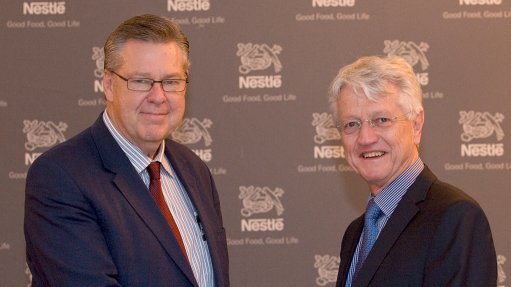
Ian Donald and Sullivan O’Carroll
Nestlé South Africa announced plans on Wednesday to invest a further R2-billion over the coming five years to grow its domestic manufacturing base, which would increasingly be used as a platform to supply into fast-growing sub-Saharan African markets.
The Swiss food and beverage group, which first entered South Africa in 1916, recently emerged from a R3.5-billion domestic investment programme and the new project pipeline would be focused on areas such as coffee and infant-nutrition products.
The previous investments had been directed towards modernising and expanding breakfast cereals and noodles production at its Babelegi factory, in Hammanskraal, launching a Cremora plant in Potchefstroom, in the North West province, and improving its distribution and supply-chain networks.
Outgoing CEO Sullivan O’Carroll, who would be succeeded by Ian Donald from October, indicated that the goal was to mimic the success of the Cremora facility in directing a good portion of the expanded output to markets in the rest of Africa.
The Potchefstroom plant was currently exporting about 10 000 t/y of Cremora into the rest of Africa, which represented about 25% of production. This, O’Carroll disclosed, was well in advance of export levels being achieved in other product areas, with exports comprising less than 5% of Nestlé South Africa’s overall yearly sales.
The South African unit comprised about 1.5% of the global group’s yearly turnover, which last year was over $98-billion.
Donald reported that the R2-billion would be deployed over the coming five years and would be directed primarily towards the expansion of its coffee factory, in Estcourt, KwaZulu-Natal.
However, Donald stressed that Nestlé South Africa would need to be price competitive if it hoped to penetrate markets in the rest of Africa and, to achieve that, it would require reliable electricity and water supply to its facilities.
The company’s plants in Harrismith, Estcourt and Babelegi had experienced power disruptions and Nestlé South Africa had been particularly concerned that Eskom might cut off power to Harrismith, owing to the municipality’s nonpayment of arrears. Following high-level political intervention the payment deadline had been shifted to enable a solution to be found.
Donald, who was returning to South Africa from a stint as the group’s Equatorial Africa market head, was also keen to further integrate the South African supply chain with that of the rest of Africa.
“The objective is not to have one-way traffic,” Donald said. He highlighted, for instance, the potential to source coffee from Ethiopia and add value to it in South Africa, rather than in Europe, as is currently the case.
“A large part of the R2-billion that will be directed to the coffee factory here will allow us to buy directly from Ethiopia and Kenya . . . and we are doing the same in dairy,” Donald explained.